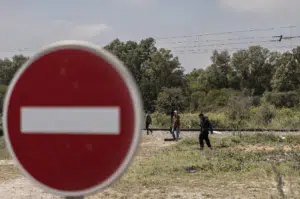Brussels – It is not just a change of narrative but a real revision of the Union’s migration policy in an increasingly restrictive direction. The latest example is provided by the draft amending the 2002 directive on aiding and abetting irregular migration, according to the version leaked from the rooms of the EU Council. The text that pushes ever more on the criminalization of people who enter, transit, or stay illegally in the territory of the 27 member countries, but also of those who offer support and solidarity. 
The Belgian rotating presidency (which ended June 30) left to the Hungarian presidency a proposal of particularly restrictive amendments to the 2002 directive and to the revision the European Commission proposed on November 28, 2023. If approved in its first wording dating back to May 31, the position of the EU Council – one of the two co-legislators along with the EU Parliament – would exclude the element of “financial benefits” to identify those guilty of the crime of aiding and abetting illegal migration. In other words, national authorities would be able to prosecute anyone suspected of aiding and abetting the entry, transit, or stay of migrants on EU soil – even without any financial gain. “After previous meetings and written comments, the [Belgian, ed.] presidency understood that there was no support for the inclusion of material and financial benefit for the three actions,” reads the text, which is now to be negotiated by the Hungarian presidency.
The specification on “material and financial benefit” would remain only as a “constituent element of facilitation of illegal stay,” with criminal sanctions as already provided in the 2002 directive (up to one-year imprisonment). On the other hand, regarding the crime of facilitation of illegal entry and transit, the proposal is to extend criminal sanctions even in cases where the ‘facilitating’ person has received no kind of financial or material benefit, which would instead constitute an “aggravating circumstance” (punishable by up to three years imprisonment). “This text goes in the direction of more, not less, criminalization of migrants and those who help them,” denounces Marta Gionco, Senior Advocacy Officer of the Picum network of NGOs: “We can expect the Council’s final position to follow this trend.”

In an attempt to soften the exacerbation of the criminalization of migration and solidarity, the Belgian presidency proposed two options for exempting humanitarian activity. The first would define that “the crime does not include humanitarian actions of assistance to third-country nationals or any other assistance aimed at meeting their basic human needs in order to preserve their human dignity or physical and mental integrity.” The second option would explicitly involve member states, which would have to take “necessary measures to ensure that the provision of humanitarian assistance” for the same purposes “is not considered a crime.” The implicit risk, however, is by subtraction. That is, national authorities could increasingly narrow the interpretation of “basic human needs,” thus limiting the leeway for any act of solidarity that goes beyond meeting needs such as “food, personal hygiene, and a place to stay”- as defined in the amended Article 3 – “so that the physical or mental health is not impaired,” or that the person is not in “a state of degradation incompatible with human dignity.”
All of this should also be read in the increasingly restrictive context with which member states would like to define the concept of “close family members,” meaning “spouse or unmarried partner engaged in a stable relationship, parents, children, and siblings”. The Belgian presidency added an amendment to “take into account the different special circumstances of dependency and the special attention to be paid to the best interest of children,” although “close family members” are included in the principle of “non-criminalization” of care but only “to meet basic human needs.” With respect to the EU Commission’s proposal, however, at the moment the 27 member states seem to reject in their rewording the crime of “public incitement of third-country nationals, for example through the Internet, to enter, transit, or stay illegally in the Union” because of the risk of indiscriminate use against civil society organizations that provide information and services to migrant people about their rights (such as seeking asylum). Attention will have to be paid, however, to how this issue will intersect with the concept of instrumentalization of migration and increasingly restrictive policies of member countries at the border, supported and funded from Brussels.
English version by the Translation Service of Withub









